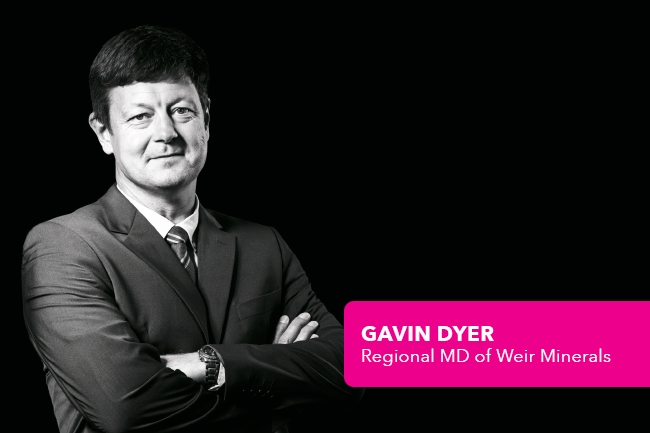The multiplier effect that the mining and resources industries have traditionally generated in Africa has had huge merits for the continent’s industrialisation. In some cases, reports the World Bank, for every one mining job, up to 1.8 jobs are created elsewhere. Weir Minerals, which has had a dedicated presence in Africa providing the minerals, oil and gas, and power industries with the design and manufacture of highly engineered products and services, is a case in point. It’s a company that bases its business ethos on building strong relationships with its workforce, customers, agents and distributors – and then developing these partnerships for mutual benefit.
Gavin Dyer, Weir Minerals’ Regional MD for Africa and the Middle East, says that of the 1 500 people employed in the company’s African operations, fewer than 10 are expatriates, which meets its mandate to develop local people in the countries in which it operates. ‘We don’t ship in expatriates for the long term. Rather, we equip local people for local operations by providing them with extensive training and mentoring as required.
‘Such training provides them with the freedom to operate, knowing that they can call on the assistance of our broader organisational resources, but they make the business work, and can do so independently.’ The success of this model is due to Weir Minerals underscoring this strategy by registering local businesses, enabling it to make meaningful contributions to local economies and pay local taxes.
This practice complements the opportunities and continued growth that Dyer has highlighted for Weir Minerals in the region, which he says are derived from critically identifying the right partners and understanding specific regional cultures.
‘We operate quite differently in Ghana to the way we do in Zambia or the DRC, for instance, and this is also dependent on the commodities produced and/or the foreign direct investment being attracted. But more importantly we stimulate opportunities for other local businesses to provide goods and services to the company,’ says Dyer, who also points out that in providing local employment opportunities, additional economic changes can improve livelihoods.
‘We have always seen value in being present on the proverbial doorsteps of our customers and will continue to expand our geographic presence in line with customer demand. It is by listening carefully to the voice of our customers, and building this into the innovation pipeline of the business that we are able to inform the improvements that we are constantly making.’
Free-flowing information between customers and Weir Minerals executives is considered the cornerstone of the business, largely because of the innovations that emerge, as well as the ideas and contributions from staff, ‘who are daily at the coalface, so they see the opportunities that result in improvements that are both efficient and cost-effective’, says Dyer.
This is important, mostly because the latest technologies in the mining sector aren’t always affordable, as reflected by the continent’s large installed base of older-generation pumping technology. Weir Minerals’ solution is to develop new and improved materials and technology to enhance the performance of the older technology.
‘Our customers therefore do not need to buy new equipment and outlay significant capital. We will help them optimise what they have until they can afford new technologies that will offer more significant improvements,’ says Dyer. ‘Our global product successes are replicable for the African market, and so it is that our value proposition is to help customers achieve the lowest total cost of ownership, which is even more important for those in remote locations.’
From a product perspective, slurry pumps have consistently put Weir Minerals in the leading market role, but in positioning itself to cater for the sector upturn, the company is preparing its operations and distribution systems to meet its growing market share in non-slurry products and services.
‘Our growth plans are ambitious, as they have always been,’ according to Dyer. ‘We aim at achieving double the growth rate of the markets we serve, and that is a minimum goal. If new products and alternate markets are required to achieve this, then we must secure those.’
This is not unfamiliar territory to Weir Minerals. It achieved similar outcomes from its five-year strategy in just three and a half years, demonstrating a relentless pursuit for growth in support of its customers.
‘Our priorities are carefully planned around how we support our markets, fine-tuning our manufacturing platforms, and our in- and outsourcing decisions.
‘We set high standards for performance and have dedicated resources that work continuously on ensuring stable value streams. Key business initiatives drive improvements and growth, and being able to draw from our global manufacturing base means we can decide on the best place to manufacture our products and impose the strict safety standards we are known for.’
For Weir Minerals, research and development is a huge area of focus. ‘Our research partnerships extend from intra-company collaboration with other design centres, to working with research-focused universities,’ says Dyer.
‘We also have a host of social responsibility initiatives, primarily focused on developing science and maths skills, which further supports our talent pipeline and the company’s sustainability.’



